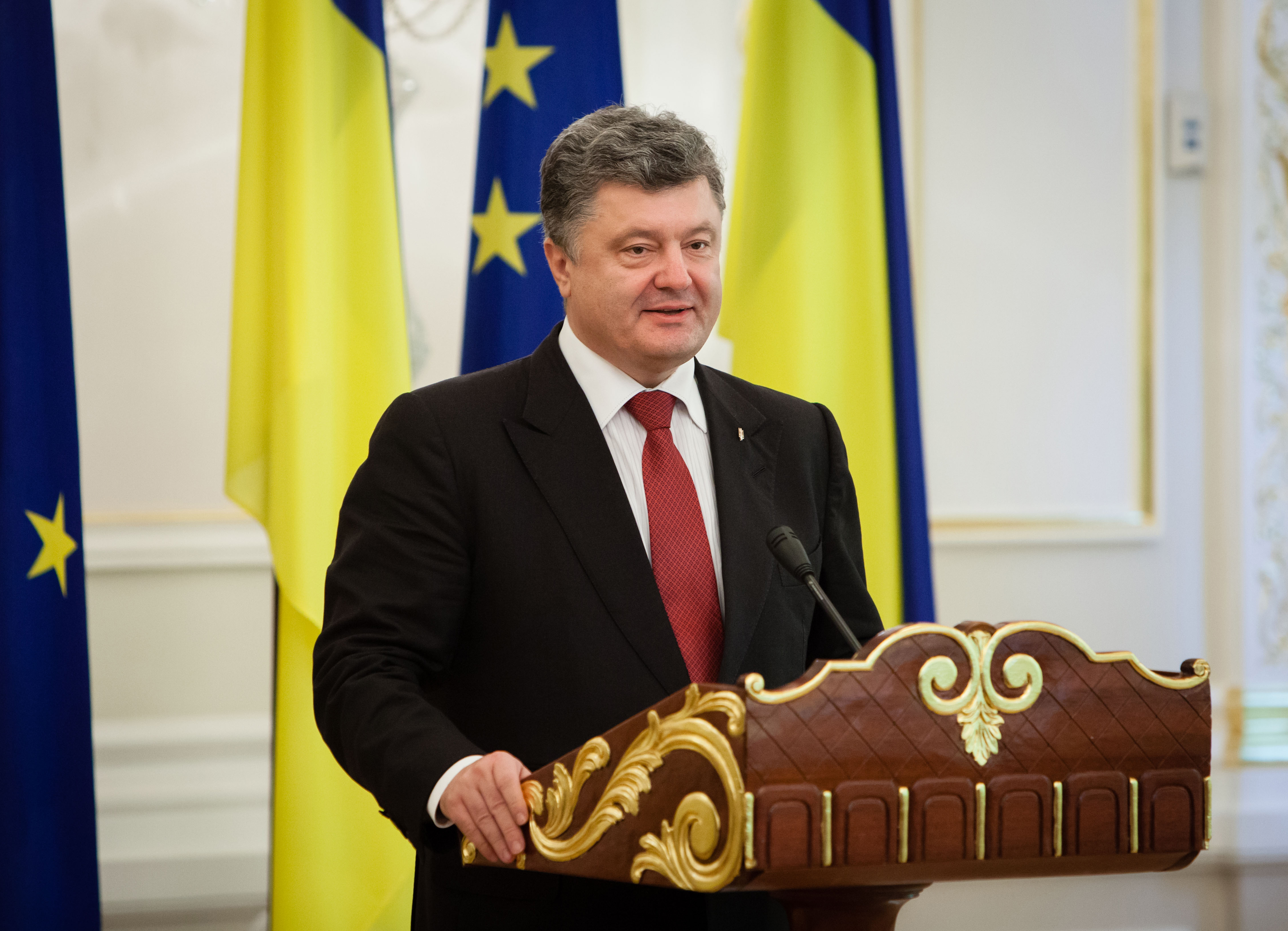Poroshenko, Petro (1965-…), is a politician, economist, and businessman who served as president of Ukraine from 2014 to 2019. He was elected to the presidency after the previous president, Viktor Yanukovych, fled the country in the face of protests against his government.

Petro Oleksiyovych Poroshenko was born on Sept. 26, 1965, in Bolhrad, near Odesa, in southwestern Ukraine. At that time, Ukraine was part of the Soviet Union. Poroshenko studied economics at Taras Shevchenko State University of Kiev (now Taras Shevchenko National University of Kyiv). He married Maryna Perevedentseva, and the couple have four children.
Ukraine gained independence after the Soviet Union broke up in 1991. At that time, companies that had been state-owned became privatized. In the following years, Poroshenko bought several confectionery manufacturing plants that had been state-owned. In 1996, he founded the candy company Roshen, which grew to become Ukraine’s largest candy manufacturer. Poroshenko became known throughout Ukraine as the “Chocolate King.”
Poroshenko was first elected to Ukraine’s parliament in 1998. In 2000, he helped found a political party that later became known as the Party of Regions. The party, led by Viktor Yanukovych, sought closer ties between Ukraine and Russia. From 2000 to 2004, Poroshenko served as the deputy head of Ukraine’s National Bank Council.
In 2001, Poroshenko joined Our Ukraine, a group of reformers led by Viktor Yushchenko that sought closer ties with Europe. In 2004, Ukraine held a presidential election, with Yanukovych and Yushchenko as the two leading candidates. Yanukovych was declared the winner. However, Yushchenko’s supporters claimed there had been massive electoral fraud and held protests against the results. Poroshenko played a leading role in the protests.
Ukraine’s Supreme Court annulled (canceled) the election results and held a new election that December. Yushchenko was declared the winner and became president. This peaceful shift of power became known as the Orange Revolution, because orange had been Yushchenko’s campaign color. In 2005, Poroshenko served as the head of the National Security and Defense Council under Yushchenko. From 2007 to 2012, Poroshenko headed the National Bank Council of Ukraine. In 2009 and 2010, he served as Yushchenko’s minister of foreign affairs.
Yanukovych was elected president in 2010. In 2012, Poroshenko served as Yanukovych’s minister of foreign affairs. In November 2013, Yanukovych suspended plans to sign a long-negotiated trade agreement between Ukraine and the European Union (EU). Some observers believed this move was influenced by pressure from Russia. Thousands of people protested against Yanukovych in Kyiv, Ukraine’s capital. The protests continued into early 2014. Confrontations between protesters and government forces turned violent. Yanukovych fled Kyiv in February. Opposition protesters formed an interim (temporary) government.
After Yanukovych fled, Russian forces seized control of the Crimean Peninsula. Crimea, which juts into the Black Sea from southern Ukraine, had been part of Ukraine since 1954. In March 2014, the Crimean parliament voted to withdraw from Ukraine. Soon after, Russia formally annexed (claimed control of) the peninsula. In April, armed pro-Russian separatists took control of cities and towns in eastern Ukraine. In May, the eastern Ukrainian regions of Donetsk and Luhansk held referendums (public votes) in which voters called for increased self-rule.
Poroshenko was elected to the presidency on May 25, 2014. He took office on June 7. He soon sent Ukrainian forces to combat the separatists in eastern Ukraine. In September, Ukraine’s parliament voted to grant self-rule to the rebel-held areas of Donetsk and Luhansk, but heavy fighting continued. In 2015, Russia and Ukraine agreed to withdraw heavy weapons from the conflict zone in eastern Ukraine as part of a cease-fire agreement. Some fighting continued, and parts of the region remained outside the central government’s control. In 2016, a long-delayed free trade agreement between Ukraine and the EU came into effect, which further strained relations with Russia.
Also in 2016, Poroshenko’s government came under increasing criticism for its failure to root out corruption, reform the economy, and return Ukraine’s eastern regions to government control. In a presidential election in 2019, Volodymyr Zelensky, a television actor, defeated Poroshenko. Zelensky took office in May.
After the election, Poroshenko’s political party reorganized as the European Solidarity party and chose him as their party leader. The party won 25 seats in the parliamentary elections of July 2019, and Poroshenko became a member of Ukraine’s parliament. In February 2022, Russian troops invaded Ukraine. Zelensky, Poroshenko, and other Ukrainian politicians joined together to oppose the Russian aggression.
